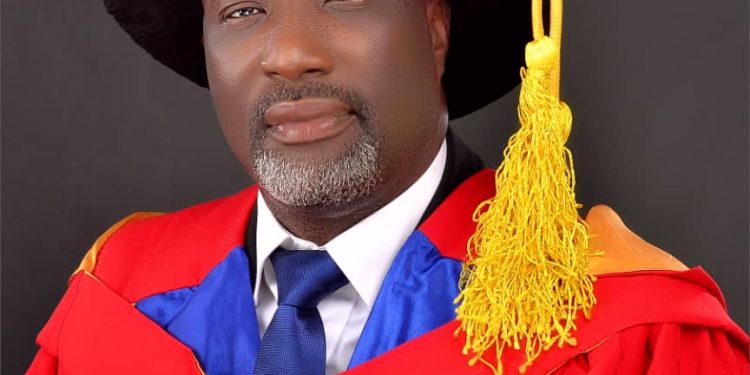Amidst the challenges imposed on the Nigerian educational system by the COVID-19 pandemic, an Ebonyi University Don, Prof. Eugene Nweke, has urged the Federal Government to equally factor resolving the conflict between it and the Academic Staff Union of Universities.
Nweke, who spoke to The Eagle Online in an interview in Abakaliki on Wednesday, explained that timely resolution of the crisis would only guarantee continued academic activities during and after the pandemic.
The Professor of Political Science and the Dean, School of Postgraduate Studies, Ebonyi State University maintained that apart from the current impact of COVID-19 on global educational system, Nigeria has before now been replete with disruptions in its academic calendar, especially at the tertiary institution level, a development he described as worrisome.
Nweke noted: “Before now, the Nigerian education system has been suffering disruption.
“This pandemic is another disruption, though global.
“But we have been having series of academic disruptions in Nigeria.
“As I am talking to you, the problem of educational system, especially in Nigeria, is not only COVID-19.
“Currently, there is national ASUU strike.
“And I will request that as we are looking towards easing off the challenge of COVID-19, we must equally factor resolving the ASUU conflict, so that we won’t move from this back to that.
“As we are easing off, let us move at the same time into normal educational and academic system.
“Again, whenever there is disruption in academic system, the University comes up with a new calendar to accommodate the lost period.”
Nweke who threw his weight behind e-learning as a means of bridging the gap created by the inhibitive aspects of the pandemic on direct academic activities, noted that the method was badly challenged in Third World countries, including Nigeria.
According to him: “COVID-19 has actually exposed the weaknesses of Third World countries, especially Nigeria, because we have always waited for things to happen before we look for solution.”
The Don regretted that while advanced countries have long embraced e-learning, Nigeria was only realising its importance because of the present negative impact of the pandemic on its schools and called for unified national policy towards achieving it.
He pointed out impediments to e-learning in Nigeria to include infrastructural challenges, digital gap among students and lecturers, high cost of internet services as well as poor funding of universities.
He also identified high cost of internet enabled devices: Laptops, Android phones, Palmtops, among others, as another great challenge considering the poverty index among students and their parents cum sponsors.
The Political Scientist advocated for a national policy to bring down the cost of internet services, subsidised digital and internet enabled gadgets for students and lecturers, as well as other policy palliatives to drive e-learning in the country.
Nweke further explained: “COVID-19 is a global challenge to education.
“As it stands now, only few cities in China are experimenting return to school
“Nigeria has very massive rural based environment, and you will agree with me that there are some places you will go now and you will not get any network signal.
“And not every network can power internet.
“Today, the world is talking about 5G network and it is generating controversies.
“But what G do we have in Nigeria, even in urban areas?
“Now consider the diversity and the dispersal residential lifestyle of Nigerians.
“And we have more population in rural areas than urban areas.
“And the question becomes: What is the strength of internet services in rural areas to drive e-learning?
“This also calls for national policy to extend network and internet services and facilities to rural areas .
“If you must talk about e-learning, especially for Universities, you must be talking about subsidy on the cost of access to gadgets because every policy must take care of the vulnerable.
“Now what we are talking about is survival first and, of course, that is why e-learning has become advisable, because if this pandemic should last all through the year or beyond, what are we going to do?
“Nigeria have not been following advancement in technology because other advanced countries have long been engaged in digital online courses
“Before now, there was the projection that in the next 10 years, you may have little or no students in the University campuses because people would study at their own conveniences online, graduate and get their certificates.
“So the challenges imposed on us by the COVID-19 has made it more impactful that we should take action without wasting time.”
Meanwhile, Nweke, who acknowledged that e-learning could only complement physical learning, but not replace it, agreed that e-learning cannot holistically serve the entire purpose of learning, especially for practical-oriented courses.
While he revealed that Ebonyi State University has set machinery in motion to come up with e-learning process for both its post-graduate and undergraduate schools, he acknowledged that it was not yet in practice in the instruction.
On how soon the institution would commence e-learning, the Don replied: “We cannot because we are facing challenges jump onto embarrassment.
“If we are taking off now, we are not taking off for the University, but for the students.
“So, what about those students who cannot even afford their meals let alone the means to key into the e-learning?”
Nweke however cautioned that Nigeria and its Universities should not allow the challenges inherent in the system hold them down but rather show willingness to overcome, adding: “If we plan well and execute well, we will have impactful outcome.”
He furthermore called on government to subsidise educational services, energy services, VATs, as well as employ other forms of policy palliatives as a way of cushioning the negative impact of COVID-19 on the citizens.



